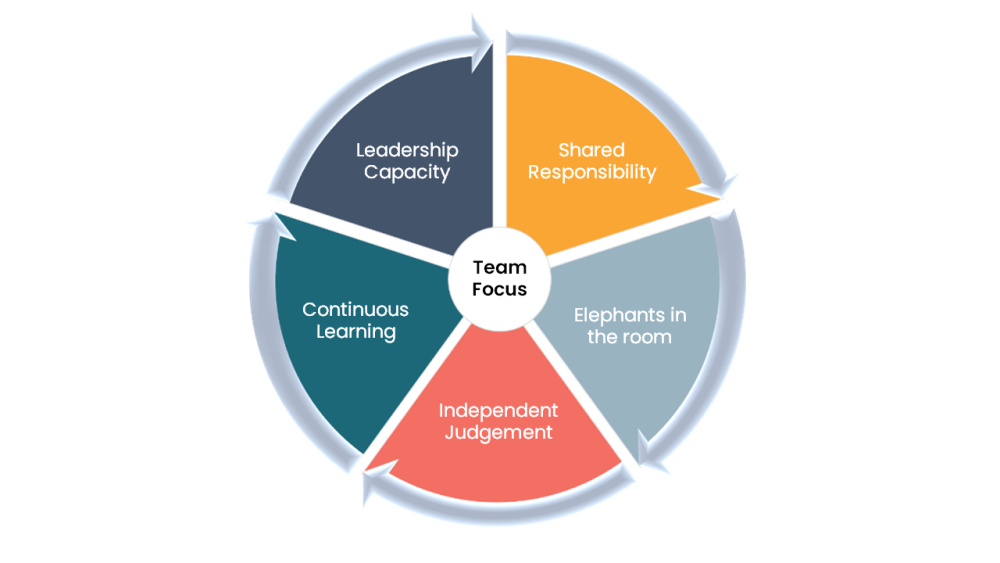Team Resilience
Teams are organisations, with many features similar to larger constructions.
A resilient team has the characteristics of
- A thriving group of people, alert and open to ideas, opportunities and change;
- A cohesive group that is, also, flexible in its approach to challenging situations;
- A harmonious group that sustains mutual support within a self-critical context;
- An influential group that uses the strategy of conviction to persuade others;
- A robust group that gets its strength from ‘institutionalised’ learning from everyday experiences;
- A group driven to achieve high performance and great success.
Strengthening the resilience of teams helps them overcome daily challenges, and keeps them on track whilst continuing to perform at a high level.
Strengthening team resilience needs to focus on the team as a whole. There are four elements involved
Team Resilience Framework
Team identity
This is about ensuring the team is seen by others as an entity that makes a significant and vital contribution to the success of the main organisation.
To consolidate on your team identity, discuss with your team members what the ‘Big Idea’ of the team is. Why does the team exist? Would the organisation be better off if the team didn’t exist? What is the justification for the existence of the team? The answers should help identify ‘The Big Idea’.
The ‘Big Idea’ is a succinct way of describing purpose. If it is helpful, think of a brand for the team, something that instantly represents what the team exists to do.
Having a clear identity will help your team feel a sense of belonging, kinship and citizenship, all of which will contribute to the resilience of the team and the personal resilience of the individuals.
Sharing Responsibility for the Future Success of the Team
This is about giving control to team members to share the responsibility for making the team a success. This requires honesty, openness as well as team members feeling psychologically safe (being able to speak out without fear that their self-esteem will be harmed).
Sharing Responsibility for the future success of the team strengthens resilience in three ways.
- By having a common purpose and sharing a duty with team members to achieve it successfully,
- By intensifying, working and kinship relationships, each team member stimulates each other to succeed, and
- By pooling the combined intelligence of the team, its mental strength is expanded, and its ideas for overcoming challenges are multiplied.
There are five elements to sharing responsibility, as shown below.
Sharing responsibility
This means each member looking out for each other so that each is properly supported in what they do. This means acting spontaneously to assist where necessary, without being asked to do so. This makes the team strong and flexible.
Elephants in the room
This is about always being open with each other, and not being fearful of the consequences. It, also, refers to the possibility that you impede open discussion about controversial and difficult subjects. In an open team, all elephants must be exposed and dealt with. This builds and maintains trust.
Independent judgement
This is about an expectation that each member will form their own view, and not follow the opinion of others without thinking through the issues for themselves. This protects the team from ‘groupthink’, and enables it to remain flexible in its thinking.
Continuous learning – is continuous learning from the experiences of the team. The team reviews events and challenges to learn how better to deal with them in the future. This expands team capacity for options to overcome challenges in the future, and builds and maintains trust.
Leadership capacity – is expanded in the team, as each is looking out for ways to make the team more successful. No single team member waits for another to do this; each does this actively on behalf of everyone.
Psychological Responsibility
Ths is about:
- Individuals safeguarding their own psychological wellbeing, and
- Ensuring they do no psychological harm to anyone else, and through their behaviour,
- Provoking others to feel psychologically well.
Psychological wellbeing is about how you feel, not about how you are. You can have physical ailments but feel fine. You can have mental ailments, and feel fine. If you feel psychologically well you are more likely to have mental strength and flexibility to overcome challenges.
This is the essence of resilience.
The implication of applying Psychological Responsibility in your team and workplace is that you can raise your concerns in your team without fear of any adverse consequences.
Responsible Management
These practices help teams maintain and strengthen resilience. Too often, management practices contribute to under-performance because they pay little attention to the psychological needs of people. However, management practices can be a force for good, funny and enjoyable, as well as provoking teams to feel psychologically well, a key ingredient of resilience.
The particular aspects of responsible management that have a beneficial impact on the resilience of the team are:
- providing encourage - encouragement adds to mental strength as the more stretching a challenge is, the stronger you become. From the team’s perspective, if everyone encourages everyone else, the team becomes stronger and more resilient.
- the approach to problem solving - flexibility in finding solutions to challenges
- ensuring the worklife balance of the team helps to feed psychological wellbeing which in turn, helps provide mental strength. This includes support of individual team members at times of domestic crisis – such support will result in reciprocity and stronger engagement with the team.
- managing meetings (you should be able to sell tickets to them) and
- agreeing mutual expectations with both other team members and work colleagues outside the team.

This article and accompanying tips have been provided for FICM by leading psychologist Dr Derek Mowbray.
To find out more about Strengthening Organisational Resilience, read Derek ’s Guide to Organisational Resilience.
To find out more about in house programmes for Organisational Resilience, email barbara.leigh@mas.org.uk, or download a pdf of all our development programmes.
More information can be found in the MAS Article Library, or why not try the MAS Questionnaires.
Want to know more?
Browse our Wellbeing resources.



